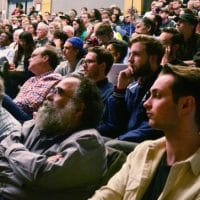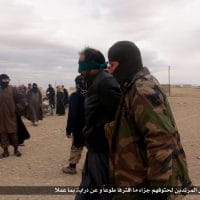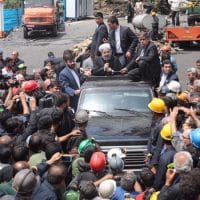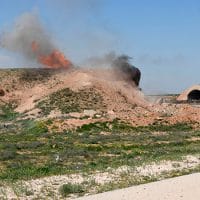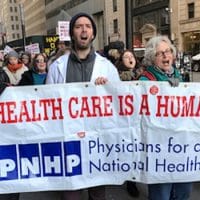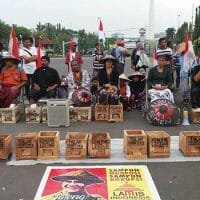-
York hosts international conference on “Marx’s Capital after 150 Years”
An international conference to mark the 150th anniversary of the first publication of Marx’s Capital was held May 24 to 26 at York University.
-
Politics of a parade
In a modern-day manifestation of the old colonial divide-and-rule tactic, corporations and New York City politicians, including the mayor, were recently caught trying to engage in backdoor deals to divide the city’s Puerto Rican community over a pro-Puerto Rican independence activist’s participation in the Puerto Rican Day Parade.
-
Britain’s Katrina moment could put radical left into power
After this week’s high-rise fire in West London—the most deadly British disaster in a generation—officials still have no idea exactly how many people were crammed into the dangerous, outdated public-housing block that stands in London’s richest borough.
-
Visions of Corbyn
In a number of recently posted articles (see here) it seemed clear that a UK General Election upset was in the making, despite the tirade of anti-Corbyn commentary from mainstream media in the UK. Now it has happened.
-
Samidoun Statement of Solidarity with U.S. Prisoners on Hunger Strike in Folsom State Prison
“[M]en stand again, just as unified, ready to sacrifice their bodies, health, and life to achieve what has already been hard fought for and accomplished. Why must California prisoners continue to sacrifice health and life, involve lawyers and courts, in order to be treated like human beings? We will continue to remind CDCR officials they will be held accountable for this type of treatment.”
-
Akala—English artist, writer and historian—comes out in support of Corbyn
“For the first time in my adult life and perhaps for the first time in British history someone I would consider to be a fundamentally decent human being…has a chance of being elected.”
-
The erasure of Syrian voices in Western media
“There were always two parallel streams in the Syrian uprising at the beginning. The civil activists who wanted democratic reform and change in the form of a secular state, and the conservative stream, which was markedly more Islamist and sectarian in its tone and demands.… the former was mostly urban, the latter rural.… As the uprising went on and the violence intensified, the civil movement became increasingly silenced and weak, while the Islamist movement became quickly more militant and radicalized”
-
Russia Blog #6: The FBI has no legal character but lots of Kompromat
The host of the daytime NPR program asked his guests how serious, and how “unprecedented” Trump’s decision to fire his FBI chief was. The guests answers were strange: they spoke about “rule of law” and “violating the Constitution” but then switched to Trump “violating norms”—and back again, interchanging “norms” and “laws” as if they’re synonyms. One of the guests admitted that Trump firing Comey was 100% legal, but that didn’t seem to matter in this talk about Trump having abandoned rule-of-law for a Putinist dictatorship. These guys wouldn’t pass a high school civics class, but there they were, garbling it all up. What mattered was the proper sense of panic and outrage—I’m not sure anyone really cared about the actual legality of the thing, or the legal, political or “normative” history of the FBI.
-
Silicon Valley’s toys contribute to Iran’s 2017 presidential election
With a few days to go to Iran’s upcoming presidential elections on 19 May, six candidates could survive the vetting process of the Guardian Councils.… The role of the media, both in Iran and throughout the diaspora, to shape public opinion is significant. Iranian state media, radio and television are supposed to give the “hopefuls” an opportunity to continue campaigning for office, as they speak about their future plans and defend past performances, but they often fall short.
-
Argentina: memory, unity and mobilization is the recipe to make Macri Retreat
May Square was, once again, the containment wall under the umbrella of the human rights organizations, which beyond their lamentable divisions, are the only reference that all great majorities respect. Precisely because when the society was muted by terror, from there emerged the first voices of pain, anger and decision so that impunity would not keep advancing. And these organisms exists because previously thousands of patriots fought in any possible way for a society without exploited people. Now Macrism is trying to vanish -for a second time- the legacy of this militancy that since 1955 and on, struggled against the dictatorships and fought for the Revolution.
-
South Africa’s business community has not stepped up honestly
Prof Patrick Bond from the University of the Witswatersrand (Wits) tells Business Day TV why the World Economic Forum, which held its annual Africa meeting last week, serves the interests of the ruling elite at the expense of communities.
-
Curiouser and Curiouser
A story worthy of a mystery author—or dramatist—has been hitting German headlines. It began when police at the Vienna airport in Austria arrested a first lieutenant of the German Bundeswehr army when he picked up a pistol hidden some weeks earlier in a bathroom. He denied it was his and was released. But his fingerprints somehow matched those of a refugee who had applied for German asylum two years earlier
-
The Promises and Limitations of Radical Local Politics
Read Michael D Yates’s informative interview with labor journalist Steve Early and Mike Parker, leader of the Richmond Progressive Alliance. The conversation focuses on both the benefits and limitations of engaging in radical politics at the local level.
-
The Steps to Ecosocialism
John Bellamy Foster and Ian Angus reply to a recent article published by Daniel Tanuro on carbon pricing schemes. Tanuro, a vehement critic of such schemes, focuses his critique on the cautiously critical support given by Foster and Angus to proposals developed by climate scientist James Hansen.
-
Russia-Baiting Pushed Trump to Attack Syria—and Increases the Risk of Nuclear Annihilation
The anti-Russia bandwagon has gained so much momentum that a national frenzy is boosting the odds of unfathomable catastrophe. Vast efforts to portray Donald Trump as Vladimir Putin’s flunky have given Trump huge incentives to prove otherwise. Last Thursday, he began the process in a big way by ordering a missile attack on Russia’s close […]
-
Miracles Can Happen
To follow German politics these days you have to like arithmetic. At first only up to six, for that many parties are now vying to get good grades, lots of votes, and more power in the September elections to the Bundestag, which will lead to a government ruling until 2021.
-
Monopolization and labor exploitation
Those who advocate “freeing the market” claim that doing so will encourage competition and thereby increase majority well-being. These advocates have certainly had their way shaping economic policies. And the results? According to several leading economists, the results include the growing monopolization of product markets and the steady decline in labour’s share of national income. Neither outcome desirable.
-
Medicare for All?
On Friday, House Republicans failed to muster enough support to pass the GOP healthcare plan, which some call Trumpcare. In response, Vermont Senator Bernie Sanders has announced he will soon introduce a bill to create a single-payer healthcare system. Several progressive groups are backing a single-payer system, including the Working Families Party, the Progressive Campaign Change Committee, CREDO, Social Security Works and National Nurses United. For more, we speak with Dr. Steffie Woolhandler, co-founder of Physicians for a National Health Program. She is a professor at CUNY-Hunter College and a primary care physician. She is also a lecturer at Harvard Medical School.
-
Kendeng Against Cement
Since March 13, 2017, over 50 local indigenous peasants known as Sedulur Kendeng, from Central Java, Indonesia, have been sitting with their feet in cement boxes in protest before the Presidential Palace. This is their second such protest in eleven months.

